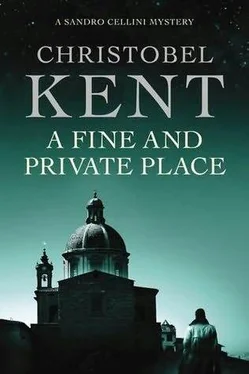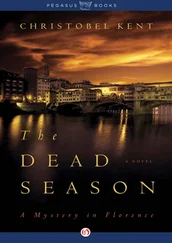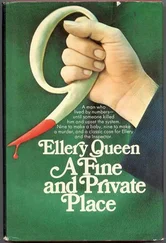Christobel Kent - A fine and private place
Здесь есть возможность читать онлайн «Christobel Kent - A fine and private place» весь текст электронной книги совершенно бесплатно (целиком полную версию без сокращений). В некоторых случаях можно слушать аудио, скачать через торрент в формате fb2 и присутствует краткое содержание. Год выпуска: 2011, ISBN: 2011, Издательство: Macmillan, Жанр: Криминальный детектив, на английском языке. Описание произведения, (предисловие) а так же отзывы посетителей доступны на портале библиотеки ЛибКат.
- Название:A fine and private place
- Автор:
- Издательство:Macmillan
- Жанр:
- Год:2011
- ISBN:9781429970808
- Рейтинг книги:4 / 5. Голосов: 1
-
Избранное:Добавить в избранное
- Отзывы:
-
Ваша оценка:
- 80
- 1
- 2
- 3
- 4
- 5
A fine and private place: краткое содержание, описание и аннотация
Предлагаем к чтению аннотацию, описание, краткое содержание или предисловие (зависит от того, что написал сам автор книги «A fine and private place»). Если вы не нашли необходимую информацию о книге — напишите в комментариях, мы постараемся отыскать её.
A fine and private place — читать онлайн бесплатно полную книгу (весь текст) целиком
Ниже представлен текст книги, разбитый по страницам. Система сохранения места последней прочитанной страницы, позволяет с удобством читать онлайн бесплатно книгу «A fine and private place», без необходимости каждый раз заново искать на чём Вы остановились. Поставьте закладку, и сможете в любой момент перейти на страницу, на которой закончили чтение.
Интервал:
Закладка:
There was a ground murmur, a shifting around the table, the muttered sounds of relief and shock mingled as people took permission to return to real life. Mauro got to his feet first, exchanging words with Ginevra, who looked visibly shaken. Nicki seemed half excited, half frightened, watching for Ginevra to get back into gear, and as for me,thought Cate, I’m on the outside. Answerable to everyone and no one, with the little motorino for a quick getaway. She sat, numb.
Per Hansen had been right: something had happened to her.
Could it be true? Dead? How could she be dead? They’d all seen her only hours earlier, only last night, fizzing with life and energy and flirtation and malice, those blue eyes bright and dangerous. Loni Meadows, Dottoressa , Director of the Orfeo Trust; suddenly it seemed to Cate absolutely impossible that such a person could die.
Yesterday morning, alive and well, in one of her haughty tempers at coffee because not enough of them wanted to go to the Pinacoteca in Siena next week. Walking down to the villino later, to see Tina’s work in progress. At drinks, talking to Alec Fairhead about someone she knew at his publisher’s. ‘Gorgeous girl,’ she’d said, giving him a sly look, ‘just your type.’ At dinner, telling Per she planned to go to Oslo for his premiere. Talking about art galleries in New York, putting people’s backs up, her life full to the brim and now gone.
Cate had seen her at eleven, and something like an hour later, she’d been dead. Cate shook her head in disbelief.
As everyone dispersed, she saw Luca Gallo’s eyes on her, and when she returned his look with a questioning glance he held up a finger to detain her.
‘I’d like to see you in my office, Caterina,’ he said. ‘Half an hour?’
‘You’ve what?’ Giuli wasn’t good at disguising her feelings; she sounded like a kid at the back of the class, crowing over a teacher’s slip.
‘I’ve lost her,’ said Sandro.
Sandro’s part-time receptionist, secretary and assistant, Giuli — Giulietta Sarto — did not have much of a CV. The daughter of a drugaddicted prostitute who worked the Via Senese and overdosed before her child was fifteen, Giuli was a graduate of prison and psychiatric hospital who had come into Sandro’s life when he had arrested her, four years earlier, for the murder of her one-time abuser. It had been his last case as a serving police officer, the same case that had led to his early retirement, and in its wake he and Luisa had as good as adopted Giuli.
Her rehabilitation had worked better than expected — thanks to them, some had said, though Sandro always argued it was down to the girl’s sheer stubborn determination — and Giuli was on his side, for better or worse. Skinny, razor-tongued and sharp as a tack, she was as close to a daughter as Sandro and Luisa were ever going to get, and Sandro for one could not have got through the previous year without her.
Half the week Giuli worked at the Women’s Centre, around the corner from the Via del Leone in the sleepy little Piazza Tasso; since close on a year earlier, more or less when Luisa started the treatment, Giuli had taken to calling in on Sandro, for a chat, or to bring him a coffee. She brought him stories from the Centre too; who’d got clean, who’d got pregnant, gossip about bent police officers and pimps and respectable women.
Then one morning she’d caught him swearing at his computer and had nudged him aside. Sitting next to him at the desk she had taught him how to organize his email address book, how to re-boot, to clean up his data and update his word-processing package, how to use internet search engines properly. And when a week or so later she’d got down on her hands and knees to pull all the drawers out of his filing cabinet to retrieve a wedge of papers that had got caught at the back, Sandro had suggested, tentatively, that she might think about formalizing the relationship, two mornings a week to start with.
Financially, of course, it made no sense at all; Sandro was hardly earning himself. But he’d always liked to find the odd twenty euros for Giuli, and this way, she was happier to take the money. And God knew, there was always something for her to do; she’d even followed the baker’s wife for him, one morning when Sandro was worried the woman had started to recognize him. By the end of the year Giulietta had saved enough to pick herself up a battered brown motorino . It looked pre-war.
‘Wouldn’t you want something a bit brighter?’ he’d asked, eyeing the ancient machine doubtfully, and Giuli had tapped the side of her nose. ‘If I had something in metallic pink with Barbie decals,’ she’d said, ‘it wouldn’t be so handy, would it? For surveillance.’
Sandro hadn’t known if she was joking or not, and the sharp, conspiratorial nudge she’d given him with her bony shoulder had not enlightened him. He’d said nothing, mulling the idea over. He didn’t want to disappoint her. But why not? Giuli was clever, and she was good at making herself invisible, a thin, watchful forty year old in market-stall clothes. She was even taking English classes, two evenings a week; she thought he didn’t know that was where his money went, but Luisa had let it slip.
He’d think about it; or at least, if they ever got another proper client, he would.
In the meantime they had an arrangement: if he was on a job and she needed to talk to him, she’d text. If she rang him, she might interrupt something; she might draw attention to him precisely when he wanted to stay invisible. The faceless bystander no one ever noticed or remembered.
Sandro mumbled. ‘What did you call about?’ He was sitting in the car, in the cold, outside the Liceo Marzocco.
His mobile had bleeped at him as he stood on the cold pavement grinding his teeth with impotent fury. Call in? The message had been sent when he’d been at that signal-free zone at the foot of the Monte Alle Croci; in the nice stuffy bar, filling up on brioche and caffè latte , reading the paper and congratulating himself on how well the day was going.
He had been able to see the gap where the pink Vespa had been as he walked up the hill. He’d planted himself on the pavement, no longer caring if he was seen, and waited for them to come out, watching for Carlotta, waiting for the long-haired boy. No show.
He’d climbed into the car to look at his phone, and dialled Giuli.
The crowd of kids had more or less dispersed now; just one or two stragglers around a lamp-post. He watched them, the phone to his ear, mouth turned down. ‘So?’
Giuli wasn’t going to let him off that easily. ‘You’re getting old, Sandro,’ she crowed, ‘I tell you, I know all the tricks in the book, where high-school students are concerned. I should be following the girl.’
And then what would I be? The redundant detective, out to grass.
‘Well, if you behaved yourself,’ he said mildly, ‘maybe I’d let you do some tailing. But for now, just tell me what you called about.’
‘Right,’ said Giuli, remembering herself. ‘OK. A call from a guy called something — um — ’ she fumbled, the sound of papers rustling took over and Sandro had to restrain a sigh. Bright, but disorganized; give her a chance.
‘Here it is.’ She resurfaced. ‘Luca Gallo.’
Sandro leaned back into the driving seat. ‘Uh huh,’ he said vaguely. For a moment the name meant nothing to him, then it did. ‘Right,’ he said. ‘The guy from the whatsit Trust.’
Across the road the kids at the lamp-post had turned to look at him; he shifted his position a bit to obscure his face from them, shoulder against the window.
‘Um — Trust, yeah. Wants you to call him.’
‘Orfeo,’ repeated Sandro automatically, his brain re-engaging. ‘The background check.’ He sighed at the thought of all those other employee checks awaiting him, and the bodyguard work. Nightclub bouncer, that’s where he’d end up. Employed as a charity case by one of Luisa’s admirers.
Читать дальшеИнтервал:
Закладка:
Похожие книги на «A fine and private place»
Представляем Вашему вниманию похожие книги на «A fine and private place» списком для выбора. Мы отобрали схожую по названию и смыслу литературу в надежде предоставить читателям больше вариантов отыскать новые, интересные, ещё непрочитанные произведения.
Обсуждение, отзывы о книге «A fine and private place» и просто собственные мнения читателей. Оставьте ваши комментарии, напишите, что Вы думаете о произведении, его смысле или главных героях. Укажите что конкретно понравилось, а что нет, и почему Вы так считаете.












